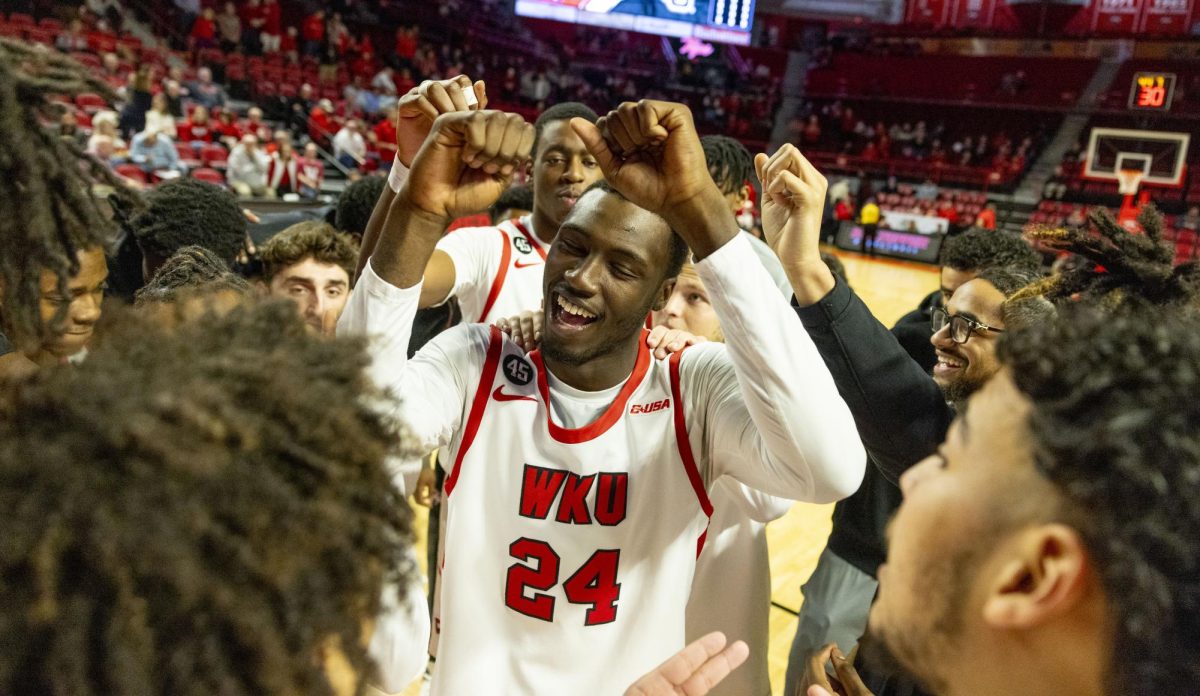Invisible Children group screens film at WKU
September 13, 2012
A group of students from across the United States have temporarily halted their lives and taken a semester off from school to travel the country to spread awareness about the Invisible Children organization and its cause.
On Wednesday, they made a stop at WKU.
Invisible Children is an organization dedicated to ending ongoing violence by the Lord’s Resistance Army (LRA) in Central Africa and apprehending its leader, Joseph Kony.
While at WKU, Invisible Children screened “The Rescue,” a documentary depicting this violence and the efforts of Invisible Children to help aid this region and bring a peaceful resolution.
In the film, Kony’s child soldiers, some as young as age 9, could be seen holding weapons and wearing military outfits. These children were likely taken from their homes at night to be enslaved to fight for the LRA.
Roy Arnold, who came with the national Invisible Children organization to WKU, actually lived with this reality.
While growing up in Uganda with his grandma, Arnold lived under the constant threat of being abducted by the LRA. Every night, he would hide in the jungle so the LRA could not find him.
It was in the jungle where he caught a debilitating case of malaria that put him in a coma, and near death.
“My grandma had lost all hope,” he said of his chances of living through the disease.
Arnold eventually regained his health, and received a scholarship from Invisible Children, which he said he never could have finished college without.
Now, Arnold said he came to America to make a difference and ensure others do not face the hardships he did.
The WKU chapter of Invisible Children, which organized with the national Invisible Children organization to put on the presentation, shares Arnold’s desire to have an impact.
One of the main benefits of the group for Bella Mukonyora, WKU’s Invisible Children Advisor, is the groups ability to foster student’s discover methods to solve conflict peacefully.
“I really liked (Invisible Children’s) emphasis on a peaceful process,” Mukonyora said.
However, WKU’s Invisible Children goals go beyond just global activism.
Hartford graduate student Chris Ford, WKU’s Invisible Children president, said WKU’s chapter not only helps raise awareness for these issues that plague Africa, but also gets involved in the local community in order to have the greatest impact possible.
Lori Akakpo, a freshman from Louisville, found out about Invisible Children in high school, now also plans to get involved with WKU’s chapter.
“I can’t sleep at night knowing I could be doing something to help these people,” she said.
Akakpo said the terror that Kony has caused is not an issue that will stay in Africa and will “impact the rest of the world.”
“We all need to help, as a community, as people,” she said.
In the last year, Invisible Children’s has received increased recognition, especially since the online release of the “Kony 2012” video.
This increased awareness was reflected at the WKU screening with over 150 people in attendance, according to Ford.
Invisible Children also believes it had a role pushed push President Barack Obama to deploy 100 military advisers to Uganda to aid in capturing Kony in 2011.
While there is increased regional and international pressure on the LRA, Kony still remains free, and Invisible Children still wants to offer aid in efforts to facilitate his capture.
Although Central Africa continues to live in fear of the LRA and Kony, Arnold is hopeful that 2012 is the year that the conflict finally ends. However, he said it will take everyone’s continued dedication for peace to finally be realized.
“It’s through you that this conflict can come to an end,” he said.













